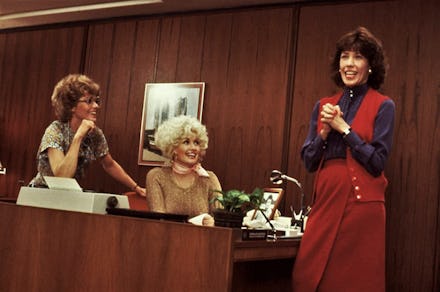'9 to 5' is the pro-union fantasy you need to stream this Labor Day

In a lot of ways, it’s fitting that the NBA put the labor movement front and center in American culture with its momentary strike last week. While professional athletes might have more leverage than, say, a secretary, it was a powerful demonstration of collective action in a summer defined by the need for collective strength. With labor day upon us, and in the spirit of celebrating worker solidarity, I recently queued up a 40-year-old cult classic, 9 to 5, a madcap movie starring Jane Fonda, Lily Tomlin, and Dolly Parton that’s still radical today.
The film is inspired by Karen Nussbaum, a real-life labor organizer who began fighting for women's rights in the workforce in the 1970s. 9 to 5 is about three fed-up employees who kidnap their “sexist, egotistical, lying, hypocritical bigot” boss and enact lots of equitable social-justice policies in his absence. It’s an over-the-top revenge fantasy with lots of smart laughs delivered by its three preternaturally talented stars. Though plenty has improved about office culture since 1980, when 9 to 5 premiered, the movie highlights inequalities and aggressions that still make it hard to succeed in business — especially if you’re a minority or a woman.
Violet Newstead (Tomlin) is the senior office supervisor at Consolidated Companies, who’s been putting up with the opportunistic and authoritarian Franklin Hart Jr. (Dabney Coleman) for more than a decade in hopes of climbing the ladder and running the place someday. Hart still condescendingly calls her his “girl” and makes Violet fetch him coffee — all microaggressions she can live with, until the boss passes her up for a promotion in favor of a less-qualified man. Judy Bernly (Fonda) winds up working in Violet’s department after her husband leaves her for his secretary. For a while, both women suspect Hart’s having an affair with his secretary, Doralee Rhodes (Parton), who puts up with some frankly criminal behavior from Hart, who routinely tries to force himself on her.
As you might expect, the women wind up bonding over their shared hatred of their tyrannical boss. After a series of almost-poisonings and some casual body snatching — truly, you must watch this film to appreciate how darkly bizarre yet wholesome it manages to be — the trio of disgruntled employees trap Hart in his own mansion and run the office in his place.
The women establish a daycare for the children of working parents. They enact a radical work-sharing program, enabling some employees to labor part-time, which drives down absenteeism. They implement diversity initiatives and equal pay mandates. (Semi-spoiler alert: the chairman of the board winds up loving most of the changes and crediting them to Hart, of course. Except for the equal pay “nonsense,” which he can’t abide.) In between, when the women are holding Hart hostage, 9 to 5 is a little reminiscent of Hustlers, due to the vicarious glee you get watching our protagonists dole out vigilante justice at an awful man’s expense.
The stars of 9 to 5 are agitators for good in real life, too. Parton is one of the wealthiest and most famous country singers of all time, yet doles out her fortune to charitable causes, like coronavirus relief and literacy programs. She also recently spoke out in support of Black Lives Matter, not caring that she alienated some conservative fans. Known as “Hanoi Jane” during the Vietnam War, Fonda is still grabbing headlines in 2020 for routinely getting arrested at climate protests. Tomlin currently stars as a radical grandma opposite Fonda in the Emmy-winning Netflix series Grace and Frankie, as anyone’s mom will tell you.
Workers in America these days increasingly walk off the job in support of social justice initiatives, like the NBA players for Black Lives Matter or the 2017 strike by New York City taxi drivers to protest Trump’s so-called Muslim ban. 9 to 5 is a cinematic reminder that workplace activism can do both — stand-up in solidarity for social justice causes and create an equitable office to everyone’s personal and collective benefit. It’s also the rare example of a comedy about labor issues, which makes 9 to 5 the perfect thing to stream next time you need to blow off some steam about your own horrible boss or, really, the world’s general unfairness.